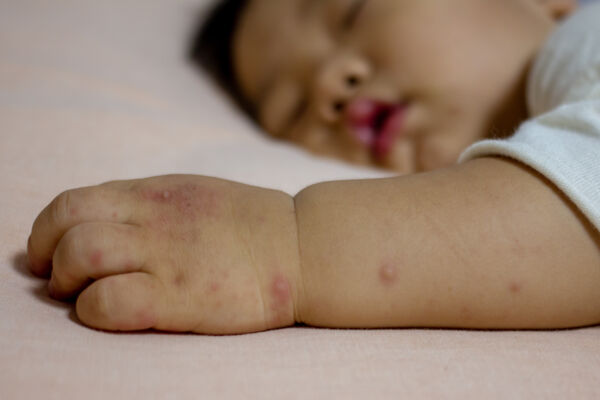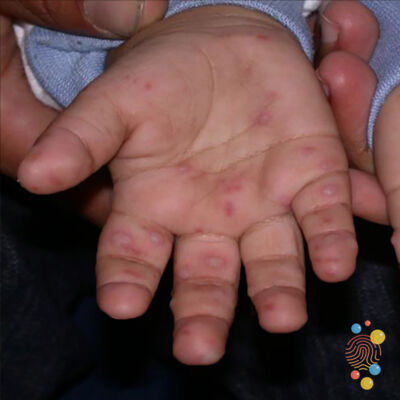Hand, foot and mouth disease
Hand Foot and Mouth is a common childhood illness, caused by a virus called Coxsackie. It is usually a mild infection that does not need specific treatment and will usually get better on its own. Antibiotics will not help.
It commonly affects children under 5 years of age, and initial symptoms can include a high temperature, sore throat, reduced appetite and generally feeling unwell.
After a few days mouth ulcers and a rash will appear. More images can be seen at www.nhs.uk/conditions/hand foot and mouth disease
Ulcers appear in the mouth and on the tongue. These can be painful and make it difficult to eat or drink.
Red spots, which develop into blisters, usually appear on the hands and feet.
The blisters are grey in the centre and can be painful.
It's possible to get hand, foot and mouth disease more than once.
If you are not sure it is Hand Foot and Mouth disease look at other childhood rashes here.
DFTB/Skin Deep have granted permission for us to use this photo (above on our site).


When should I worry?
If your child has any of the following:
- Has blue lips
- Too breathless to talk / eat or drink
- Becomes pale, mottled and feels abnormally cold to touch
- Becomes extremely agitated, confused or very lethargic (difficult to wake)
- Develops persistent headache, neck stiffness or balance problems
- Has a fit or seizure
- Has a rash that does not disappear with pressure (the ‘Glass Test’)
You need urgent help.
Go to the nearest Hospital Emergency (A&E) Department or phone 999
If your child has any of the following:
- Increasing pain and redness between the spots
- Symptoms do not improve after 10 days
- Temperatures for 5 or more days
- Seems dehydrated: (sunken eyes, drowsy, no urine passed in 12 hours)
- Has extreme shivering or complains of muscle pain
- Is getting worse of if you are worried
You need to contact a doctor or nurse today.
Please ring your GP surgery or call NHS 111 - dial 111
If your child has any of the following:
Continue providing your child’s care at home. If you are still concerned about your child, speak to your health visitor, or local pharmacist or call NHS 111– dial 111.
You should keep your child off school of the nursery while they are feeling unwell. However, once they are feeling better they can go back to nursery/school and there is no need to wait until all the blisters have healed. However, it is best to let the school or nursery know that they have had hand foot, and mouth disease
Self care
Continue providing your child’s care at home. If you are still concerned about your child, call NHS 111 – dial 111
Children and young people who are unwell and have a high temperature should stay at home. They can go back to school, college or childcare when they no longer have a high temperature, and are well enough to attend.
What should you do?
Seeing your child unwell with hand foot and mouth disease can be very distressing for a parent and while there is no treatment for the virus itself there are simple things you can do to make your child more comfortable:
- Get them to drink plenty of fluids and try ice lollies if your child is not drinking much
- Try soft foods like soup, yoghurt or ice cream – avoid hot and spicy foods as these may be painful on ulcers in the mouth
- Speak with a pharmacist for advice about treatments, such as mouth ulcer gels, sprays and mouthwashes to relieve pain.
- Paracetamol or ibuprofen for temperature / pain
- While there is normally no risk to pregnant people it is best to avoid close contact if possible
You can't take antibiotics or medicines to cure hand, foot and mouth disease – it has to run its course. It usually gets better in 7 to 10 days.
How long will your child’s symptoms last?
- Hand foot and mouth disaease usually lasts 7-10 days
- It is easy to spread for first 5 days (it is spread in sneezes, coughing and poo)
- Wash your hands often and avoid sharing towels at home
- You should keep your child off school of nursery while they are feeling unwell
- Once they are feeling better they can go back and there is no need to wait until all the blisters have healed. It is best to let the school or nursery know.
How to stop hand foot and mouth disease spreading?
Hand, foot and mouth disease is easily passed on to other people. It's spread in coughs, sneezes and poo.
You're infectious from a few days before you have any symptoms, but you're most likely to give it to others in the first 5 days after symptoms start.
To reduce the risk of spreading hand, foot and mouth disease:
- wash your hands often with warm soapy water – and teach children to do so
- use tissues to trap germs when you cough or sneeze
- bin used tissues as quickly as possible
- don't share towels or household items – like cups or cutlery
- wash soiled bedding and clothing on a hot wash
For wear and tear, minor trips and everything in between.
Self-care
You can treat your child's very minor illnesses and injuries at home.
Some illnesses can be treated in your own home with support and advice from the services listed when required, using the recommended medicines and getting plenty of rest.
Sound advice
Children can recover from illness quickly but also can become more poorly quickly; it is important to seek further advice if a child's condition gets worse.
For information on common childhood illnesses go to What is wrong with my child?
Pharmacists are experts in many aspects of healthcare and can offer advice on a wide range of long-term conditions and common illnesses such as coughs, colds and stomach upsets. You don’t need an appointment and many have private consultation areas, so they are a good first port of call. Your pharmacist will say if you need further medical attention.
Sound advice
- Visit a pharmacy if your child is ill, but does not need to see a GP.
- Remember that if your child's condition gets worse, you should seek further medical advice immediately.
- Help your child to understand - watch this video with them about going to the pharmacy.
For information on common childhood illnesses go to What is wrong with my child?
Health visitors are nurses or midwives who are passionate about promoting healthy lifestyles and preventing illness through the delivery of the Healthy Child Programme. They work with you through your pregnancy up until your child is ready to start school.
Health Visitors can also make referrals for you to other health professionals for example hearing or vision concerns or to the Community Paediatricians or to the child and adolescent mental health services.
Contact them by phoning your Health Visitor Team or local Children’s Centre.
Sound advice
Health visitors also provide advice, support and guidance in caring for your child, including:
- Breastfeeding, weaning and healthy eating
- Exercise, hygiene and safety
- Your child’s growth and development
- Emotional health and wellbeing, including postnatal depression
- Safety in the home
- Stopping smoking
- Contraception and sexual health
- Sleep and behaviour management (including temper tantrums!)
- Toilet training
- Minor illnesses
For more information watch the video: What does a health visitor do?
School nurses care for children and young people, aged 5-19, and their families, to ensure their health needs are supported within their school and community. They work closely with education staff and other agencies to support parents, carers and the children and young people, with physical and/or emotional health needs.
Contacting the School Nurse
Primary and secondary schools have an allocated school nurse – telephone your child’s school to ask for the contact details of your named school nurse.
There is also a specialist nurse who works with families who choose to educate their children at home.
Sound Advice
Before your child starts school your health visitor will meet with the school nursing team to transfer their care to the school nursing service. The school nursing team consists of a school nursing lead, specialist public health practitioners and school health staff nurses.
They all have a role in preventing disease and promoting health and wellbeing, by:-
- encouraging healthier lifestyles
- offering immunisations
- giving information, advice and support to children, young people and their families
- supporting children with complex health needs
Each member of the team has links with many other professionals who also work with children including community paediatricians, child and adolescent mental health teams, health visitors and speech and language therapists. The school health nursing service also forms part of the multi-agency services for children, young people and families where there are child protection or safeguarding issues.
GPs assess, treat and manage a whole range of health problems. They also provide health education, give vaccinations and carry out simple surgical procedures. Your GP will arrange a referral to a hospital specialist should you need it.
Sound advice
You have a choice of service:
- Doctors/GPs can treat many illnesses that do not warrant a visit to A&E.
- Help your child to understand – watch this video with them about visiting the GP or going to a walk in centre
For information on common childhood illnesses go to What is wrong with my child?
If you’re not sure which NHS service you need, call 111. An adviser will ask you questions to assess your symptoms and then give you the advice you need, or direct you straightaway to the best service for you in your area.
Sound advice
Use NHS 111 if you are unsure what to do next, have any questions about a condition or treatment or require information about local health services.
For information on common childhood illnesses go to What is wrong with my child?
A&E departments provide vital care for life-threatening emergencies, such as loss of consciousness, suspected heart attacks, breathing difficulties, or severe bleeding that cannot be stopped. If you’re not sure it’s an emergency, call 111 for advice.


